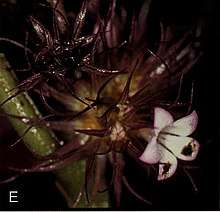Amphidasya
Amphidasya is a genus of flowering plants in the family Rubiaceae. It was described by Paul Carpenter Standley in 1936.[2] The genus is found in Central America and northern South America.[1]
| Amphidasya | |
|---|---|
 | |
| Amphidasya amethystina | |
| Scientific classification | |
| Kingdom: | Plantae |
| Clade: | Tracheophytes |
| Clade: | Angiosperms |
| Clade: | Eudicots |
| Clade: | Asterids |
| Order: | Gentianales |
| Family: | Rubiaceae |
| Subfamily: | Rubioideae |
| Tribe: | Urophylleae |
| Genus: | Amphidasya Standl. |
| Type species | |
| Amphidasya ambigua (Standl.) Standl. | |
| Synonyms[1] | |
| |
Species
- Amphidasya ambigua (Standl.) Standl. - Panama, Colombia, Ecuador
- Amphidasya amethystina J.L.Clark & C.M.Taylor - Ecuador
- Amphidasya brevidentata C.M.Taylor - Colombia
- Amphidasya bullata Standl. - Colombia
- Amphidasya colombiana (Standl.) Steyerm. - Colombia, Ecuador, Peru
- Amphidasya elegans C.M.Taylor - Colombia, Ecuador
- Amphidasya intermedia Steyerm. - Colombia
- Amphidasya longicalycina (Dwyer) C.M.Taylor - Costa Rica, Nicaragua, Panamá, Colombia
- Amphidasya neblinae Steyerm. - Venezuela, Brazil
- Amphidasya panamensis C.M.Taylor - Panamá
- Amphidasya spathulata Dwyer - Panamá, Colombia
- Amphidasya umbrosa (Wernham) Standl. - Colombia
- Amphidasya venezuelensis (Standl.) Steyerm. - Venezuela
gollark: It would be very funny, since I dislike DE.
gollark: Assuming I can resolve some minor issues like "how do I set up the ritual without utter apification of it by chaos" can be resolved, I may *actually* become the first person on here to beat the chaos guardian.
gollark: I wonder how long it can keep the guardian frozen for anyway.
gollark: This is funnier.
gollark: The alternative would be to actually engage it in combat and use a lot of Last Stand enchantments, but no.
References
- "Amphidasya in the World Checklist of Rubiaceae". Retrieved 27 November 2011.
- Standley, Paul Carpenter. 1936. Publications of the Field Museum of Natural History, Botanical Series 11(5): 180.
This article is issued from Wikipedia. The text is licensed under Creative Commons - Attribution - Sharealike. Additional terms may apply for the media files.